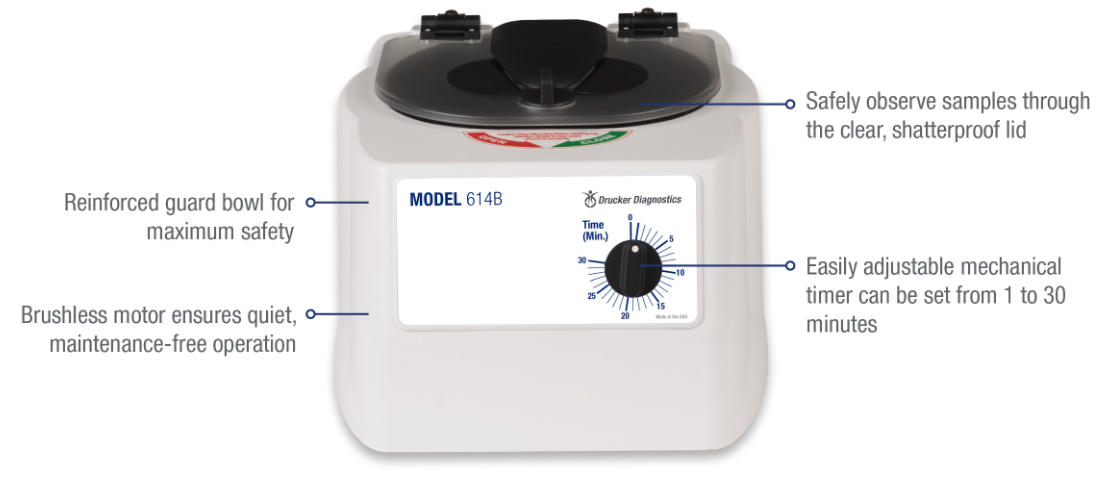Drucker Diagnostics, 00-004-009-001, 614B Fixed Angle Single-Speed Centrifuge
Features:
- Mechanical Timer – 1 to 30 minutes allowing for a wide range of applications;
- Fixed-Angle Rotor – Fixed angle separations for up to six (6) tubes;
- Tube Sizes – 0.5 mL to 15 mL; up to 17 mm. x 125 mm.;
- Brushless AC Motor – Years of operation with no routine maintenance;
- Quiet Operation – A double-encased motor and the "stability mount" design provides excellent imbalance stability;
- Cool Operation – Unique design of the convection based cooling system protects the samples even under the heaviest workloads;
- Footprint – Compact design uses approximately 1 sq. ft. of counter space;
- Positive Lid Latching – Firm mechanical latching of the lid prevents the escape of debris;
- Clear Shatter Proof Lid – Allows for safe sample observation and optical calibrations;
- Reinforced Side Walls – Glass fiber reinforced nylon and high impact polycarbonate provide dual layers of safety protection;
- Regulatory Approvals – Certified to US and Canadian safety regulations and standards.
Benefits:
- Easy to Use: Set right every time. The 614B offers a single g-force setting of 1,100 xg for error-free operation and an adjustable mechanical dial from 1 to 30 minutes.
- A Great Value: Unbeatable quality for any budget. Each centrifuge arrives ready to run with fixed angle rotor and tube holders.
- Built to Last: The 614B's reinforced components and brushless motor provide years of maintenance-free operation and the automatically locking lid enhances lab safety.
Unique Features:

The model 614B centrifuge provides runtime flexibility and fixed angle processing at an affordable price. With a single g-force setting of 1,100 xg and an adjustable mechanical timer from 1 to 30 minutes, there is no need to select from a variety of complicated options. The 614B provides error-free chemistry and coag spins, every time. This unit is ideal for doctor’s offices, small clinics, laboratories and anywhere specimens are analyzed on site.
NOTE: Fixed-angle centrifuges produce gel layers that may be susceptible to rupture during transport. These damaged samples must be re-centrifuged – a process the CLSI does not recommend due to its known negative effects on analytical results.